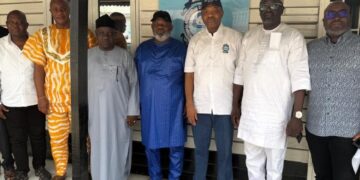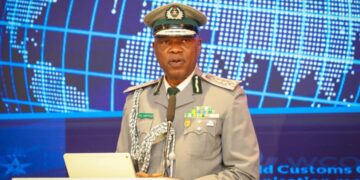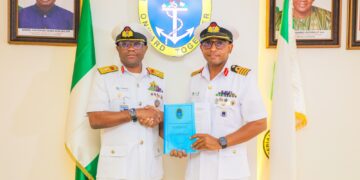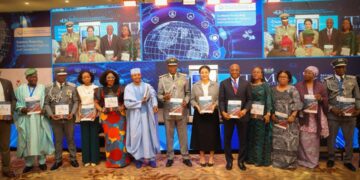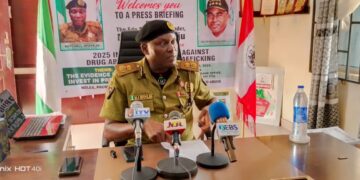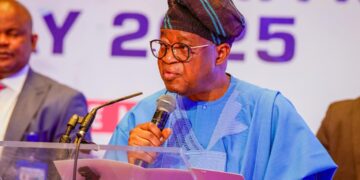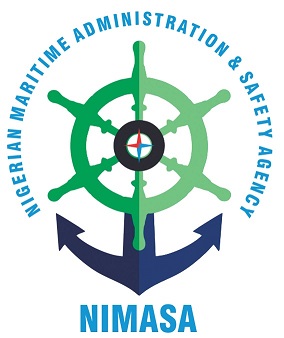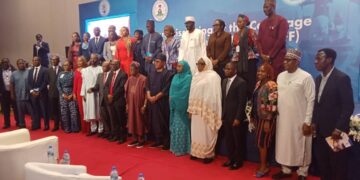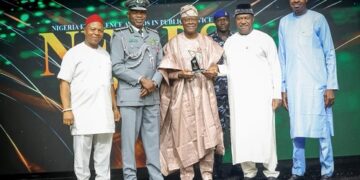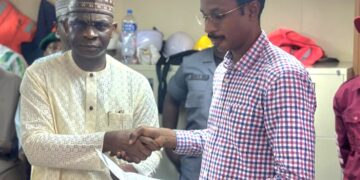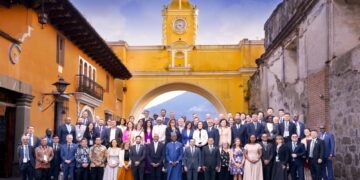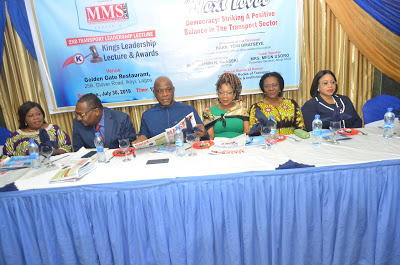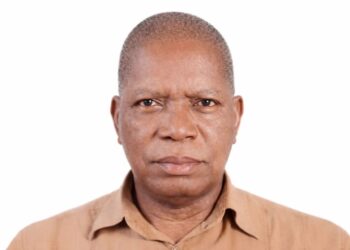Stakeholders in Nigeria’s transport sector have called on the Federal Government to
eschew politics and restrict its appointment of heads of parastatals to
transport professionals, considering what they described as shortcomings in the sector.
eschew politics and restrict its appointment of heads of parastatals to
transport professionals, considering what they described as shortcomings in the sector.
These experts made this call
during the 2019 MMS Transport Leadership lecture and awards organized by Kings
Communications Limited, stressing that the position of the Minister of
Transportation should also be reserved for industry experts.
Speaking at the event, a maritime lawyer, Barr. Emmanuel Nwagbara, moved a motion to demand that
the forum of maritime stakeholders want a Minister who is a technocrat in the
maritime sector.
the forum of maritime stakeholders want a Minister who is a technocrat in the
maritime sector.
“I want to move a motion that
this forum of maritime stakeholders wants a Minister that is a technocrat in
the maritime sector. It doesn’t matter if a Minister who isn’t a technocrat has
already been appointed; we could designate someone for that purpose,” he said.
this forum of maritime stakeholders wants a Minister that is a technocrat in
the maritime sector. It doesn’t matter if a Minister who isn’t a technocrat has
already been appointed; we could designate someone for that purpose,” he said.
“Stakeholders can come up with
a publication in a renowned medium like MMS Plus demanding that the industry
needs a technocrat to drive the Ministry of Transportation and give meaning and
focus to the maritime industry. The maritime industry is like a weeping child
that needs to be consoled in the transportation sector in Nigeria. There are so
many gaps and deficiencies” he added.
a publication in a renowned medium like MMS Plus demanding that the industry
needs a technocrat to drive the Ministry of Transportation and give meaning and
focus to the maritime industry. The maritime industry is like a weeping child
that needs to be consoled in the transportation sector in Nigeria. There are so
many gaps and deficiencies” he added.
Meanwhile, the transport
veterans also urged the Federal Government to address the numerous challenges
which have made the transport environment harsh for businesses to thrive,
especially with the recent signing of the African Continental Free Trade
Agreement (AfCFTA),
veterans also urged the Federal Government to address the numerous challenges
which have made the transport environment harsh for businesses to thrive,
especially with the recent signing of the African Continental Free Trade
Agreement (AfCFTA),
Noting that the current frosty
state of the nation’s transport sector would place the country in a
disadvantageous position when the implementation of AfCFTA begins, the
Executive Secretary at Nigerian Shippers’ Council (NSC) Mr. Hassan Bello, said: “Government is aware that the Nigerian transport environment is harsh as it is.
The first thing is to realize that the sector is harsh and the government has
realized this and it is taking deliberate steps to make sure that the
environment is less harsh.”
state of the nation’s transport sector would place the country in a
disadvantageous position when the implementation of AfCFTA begins, the
Executive Secretary at Nigerian Shippers’ Council (NSC) Mr. Hassan Bello, said: “Government is aware that the Nigerian transport environment is harsh as it is.
The first thing is to realize that the sector is harsh and the government has
realized this and it is taking deliberate steps to make sure that the
environment is less harsh.”
He stated that the development
of AfCFTA, which would have about 1.3 billion people affected in the $2.3 billion
economy, meant African nations including Nigeria should brace up for
competition and a free economy devoid of protectionism.
of AfCFTA, which would have about 1.3 billion people affected in the $2.3 billion
economy, meant African nations including Nigeria should brace up for
competition and a free economy devoid of protectionism.
“Nigerian infrastructure must
be rebuilt to reduce cost of production to give the nation an edge with AfCFTA.
We are exploring how Nigeria can fit into this and grow its economy based on
its trade, production, efficiency and infrastructure. We are talking about
transport infrastructure and energy. These are two very important things that
we have to concentrate on at this conference. I’m sure that there will be
fireworks during the conference and the transport fraternity will bring
something for the government to consider,” he said.
be rebuilt to reduce cost of production to give the nation an edge with AfCFTA.
We are exploring how Nigeria can fit into this and grow its economy based on
its trade, production, efficiency and infrastructure. We are talking about
transport infrastructure and energy. These are two very important things that
we have to concentrate on at this conference. I’m sure that there will be
fireworks during the conference and the transport fraternity will bring
something for the government to consider,” he said.
He observed that the organizers
were able to bring key stakeholders together. “We have the terminal operators,
shipping lines, government, freight forwarders, railway and aviation experts
and all categories of people who contribute to this industry. The essence of
coming together is to churn out policies” he added.
were able to bring key stakeholders together. “We have the terminal operators,
shipping lines, government, freight forwarders, railway and aviation experts
and all categories of people who contribute to this industry. The essence of
coming together is to churn out policies” he added.
On his part, the Chairman of
the occasion and former Director General of the Nigerian Maritime
Administration and Safety Agency (NIMASA), Barr. Temisan Omatseye observed that
the Cabotage Regime in Nigeria had failed.
the occasion and former Director General of the Nigerian Maritime
Administration and Safety Agency (NIMASA), Barr. Temisan Omatseye observed that
the Cabotage Regime in Nigeria had failed.
He urged the industry experts
saddled with the responsibility of Cabotage review under the NIMASA Joint
Stakeholders committee, to work on the issue as though Cabotage was just
beginning in the country.
saddled with the responsibility of Cabotage review under the NIMASA Joint
Stakeholders committee, to work on the issue as though Cabotage was just
beginning in the country.
Noting that the problems in
Cabotage implementation started under his leadership, he absorbed some of the
blame, “To fail is not a bad thing, you can only learn from your failures and
we are learning from our failures. That is why I am going to probably say,
whether I like it or not, I take blame for whatever way I have been part of the
failure and I apologize for that failure. But the bottom line quite simply is,
I will say it the way it is, Cabotage has failed. Let us start from today to
make Cabotage work.”
Cabotage implementation started under his leadership, he absorbed some of the
blame, “To fail is not a bad thing, you can only learn from your failures and
we are learning from our failures. That is why I am going to probably say,
whether I like it or not, I take blame for whatever way I have been part of the
failure and I apologize for that failure. But the bottom line quite simply is,
I will say it the way it is, Cabotage has failed. Let us start from today to
make Cabotage work.”
Meanwhile, in the lecture
titled, “Leadership In A “Next Level” Democracy: Striking A Positive Balance In
Transport Sector,” the Secretary-General of Abuja Memorandum of Understanding
(MoU), on Port State Control for West and Central African Region, Mrs. Mfon
Usoro admonished Nigeria to find its area of advantage in the transport sector
and capitalize on it.
titled, “Leadership In A “Next Level” Democracy: Striking A Positive Balance In
Transport Sector,” the Secretary-General of Abuja Memorandum of Understanding
(MoU), on Port State Control for West and Central African Region, Mrs. Mfon
Usoro admonished Nigeria to find its area of advantage in the transport sector
and capitalize on it.
She stressed the crucial role
of leaders in ensuring that the sector’s goals are clearly outlined and all
stakeholders in the public and private sector are focused on achieving the
identified goals, noting that the government and the industry must work
together to gather and direct resources both human and capital towards the
achievement of these goals.
of leaders in ensuring that the sector’s goals are clearly outlined and all
stakeholders in the public and private sector are focused on achieving the
identified goals, noting that the government and the industry must work
together to gather and direct resources both human and capital towards the
achievement of these goals.
According to her, African
countries could be popular like other leading countries in shipping business if
they recognized and harnessed all the means of transportation such as road,
rail, water, piping and air transportation systems.
countries could be popular like other leading countries in shipping business if
they recognized and harnessed all the means of transportation such as road,
rail, water, piping and air transportation systems.
She added that having
integrated policy and linkages was the only way to make African countries a
force to reckon with in global shipping business.
integrated policy and linkages was the only way to make African countries a
force to reckon with in global shipping business.
“There are four categories
maritime nations can dominate, they are; Shipping, Maritime Finance, Maritime
Logistics and Maritime Technology. China is leading under shipping, Singapore
is leading in the area of maritime logistics, New York is leading in maritime
finance, while South Korea is leading in terms of maritime technology. It is
the country that distinguishes itself in a particular area that will gain
advantage”, she said.
maritime nations can dominate, they are; Shipping, Maritime Finance, Maritime
Logistics and Maritime Technology. China is leading under shipping, Singapore
is leading in the area of maritime logistics, New York is leading in maritime
finance, while South Korea is leading in terms of maritime technology. It is
the country that distinguishes itself in a particular area that will gain
advantage”, she said.
Noting that AfCFTA was more of
an opportunity than a threat to Nigeria, she said, “AfCFTA is a positive
development but for the continent and Nigeria in particular to benefit every
sector has to sit up to take advantage of what we have and what we can do”
an opportunity than a threat to Nigeria, she said, “AfCFTA is a positive
development but for the continent and Nigeria in particular to benefit every
sector has to sit up to take advantage of what we have and what we can do”
The event also featured the
award of the Most Purposeful Transport Agency in 2018 to the Accident
Investigation Bureau (AIB). AIB had qualified for the accolade after ranking
top in among fourteen transport agencies rated quarterly in 2018 by MMS Plus newspaper.
award of the Most Purposeful Transport Agency in 2018 to the Accident
Investigation Bureau (AIB). AIB had qualified for the accolade after ranking
top in among fourteen transport agencies rated quarterly in 2018 by MMS Plus newspaper.
Earlier, the Chief Executive
Officer, Kings Communications Limited, Mr. Kingsley Anaroke lamented that the
transport sector had suffered from poor leadership over the years as the choice
candidates for positions in the sector haven’t been driven by professionalism.
Officer, Kings Communications Limited, Mr. Kingsley Anaroke lamented that the
transport sector had suffered from poor leadership over the years as the choice
candidates for positions in the sector haven’t been driven by professionalism.
According to Anaroke, this
problem has limited the contributions of the transport sector to national
growth.
problem has limited the contributions of the transport sector to national
growth.
He noted that the quest to
maximize the huge potentials in the sector through the right leadership or
performance- based leadership capable of positioning the sector to take its
critical place in the Next Level agenda of the current regime and the emerging
new technology-driven transportation world gave birth to the MMS Transport
Agencies’ Performance Rating with its
reward system, an award for sterling performance to spur others to action,
while the lecture arm of it, the Transport Leadership Lecture is to help
crystallize the philosophy of good governance.
maximize the huge potentials in the sector through the right leadership or
performance- based leadership capable of positioning the sector to take its
critical place in the Next Level agenda of the current regime and the emerging
new technology-driven transportation world gave birth to the MMS Transport
Agencies’ Performance Rating with its
reward system, an award for sterling performance to spur others to action,
while the lecture arm of it, the Transport Leadership Lecture is to help
crystallize the philosophy of good governance.



